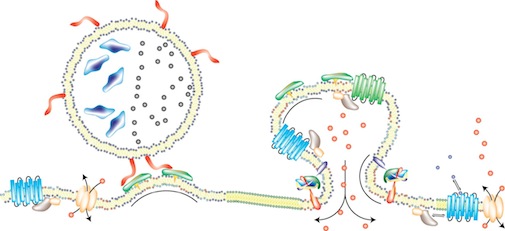Master course on Nanoscale Properties of Biological Membranes

TIME: Block 4B (9 weeks in HCØ)
PLACE: HCØ, the SCIENCE faculty
CREDITS: 7.5 ECTS for bachelor and masters, 10 ECTS for PhD students
DESCRIPTION:
Biological membranes are the nanoscale boundaries that separate the cytoplasm of the cell from the extracellular environment and define intracellular compartments and organelles. While initially recognized mostly as static, it is now established that membranes change shape and properties in striking ways thus controlling multiple fundamental processes of life such as cell signaling and sensory pathways. Their overall shape and characteristics is tightly regulated by a continuous interplay between the lipid constituents and membrane-associated proteins. On the other hand multiple’s protein function as well as trafficking and sorting are regulated by membrane characteristics and
shape. As a result a multitude of essential cellular functions including endocytosis and signalling are controlled by the complex interplay between membrane properties and membrane associated proteins properties. The scope of this class is to provide essential understanding of the membrane related interactions that control key elements of cellular life. We will initially discuss the effect of membrane characteristics such as composition shape and domain formation, on the dynamics and function of enzyme associated or activated by membranes. We will continue with the mechanism of membrane-mediated protein trafficking and sorting in cellular compartments and its relation to signaling pathways. Subsequently we will discuss the protein-mediated effect on membranes
remodeling related to cellular functions such as endocytosis, SNARE mediated fusion and vesicle trafficking. By the end of the class students will be well acquainted with a mechanistic knowledge of multiple cellular functions.
Contact the course responsibles directly: Nikos Hatzakis: hatzakis@nano.ku.dk or Dimitrios Stamou : stamou@nano.ku.dk
Read about the research of the course responsibles here: Nikos Hatzakis and Dimitrios Stamou.
